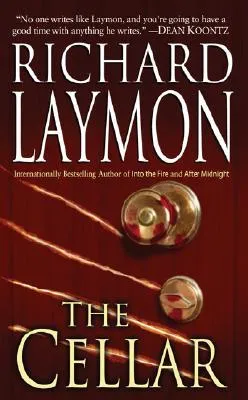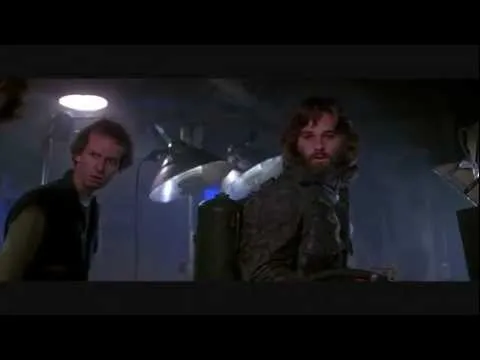
Laymon's been a polarizing force in the world of horror since the publication of this book in 1980. People can argue the merits of Barker, Campbell, Herbert, and Simmons, some of the most literary horror authors the genre has birthed, until the cows come home, but Laymon brooks no debate -- he was the literal incarnation of the guy you either love to death or you cannot stand, and I fall unashamedly in the first camp. What's more, if you're a Laymon fan, then no other writer comes close to what he offers. He brings the creeps, he brings the humor, he brings the bumbling immaturity of the direct-to-video B-grade horror film to life in his prose, and he does so without apology or expectation that you'll treat it as anything less than what it is. Laymon's writing is what it is, aspiring to no literary pretension, often taking off like a Navy fighter jet catapulted off a carrier over open water and never slowing down. Once you're aloft, that's when you discover there's no parachute, no eject button, and the pilot makes Murdock from The A-Team look like the poster child for mental fitness. All you can do is hold on for dear life and pray the guy remembers how to land. The good news is, most of the time you're in good hands. The Cellar, though, is easily his most polarizing work. At least, it polarized the hell out of me, and I love the dude.
Story-wise, it seems pretty dead-basic horror fare: we get a prologue where a guy who is eagerly going for the gold in the 'worst father ever' Olympics has broken into a tourist attraction with his young son after dark to disprove the Beast House's legend that it contains actual beasts.
Spoiler alert: Beast House is correctly named.
Additional spoiler alert: said dad only earns the silver, as we discover upon starting chapter 2.
Chapter one gives us Donna and her twelve-year old daughter Sandy. Donna's informed her abusive ex-husband has just been released from prison, so she packs a suitcase, grabs her daughter, and gasses up the car for a long-distance Sunday drive in an effort to get as far away from their apartment as possible, because Donna knows Roy's going to hunt them down. They get as far as Malcasa Point, home of the infamous Beast House.
Chapter two introduces Roy, who easily scoops the gold away from Nameless Dad #1, for a variety of reasons, all of them having to do with what he likes doing to little girls. We learn way more about this than anyone should be comfortable learning.
Jud Rucker shows up in chapter three, a man on a mission to murder the Beast of Malcasa Point. Good thing too, because Donna and Sandy could use the protection of a man with brass balls; in chapter 8 we'll learn just how far Roy's willing to go to find out where they've run away to.
By now you've got the set-up down pat in your mind, you know how the book's going to play out, and it's just a matter of getting through the next 120 or so pages to reach the conclusion which, in your mind, is already so foreshadowed even the worst fortune teller on the carnival midway could read those cards without error.
You couldn't be more wrong.
I've seen numerous critiques of Laymon over the years from reviewers claiming he had no idea what he was doing, he was a shit writer, couldn't plot his way through a stroll in a park, his technique smacks of rank amateurism that never improved all that much over a thirty-year career, he was a talentless hack, and so on and so forth, ad nauseum. I understand from whence this criticism arises, but it's all charade.
Laymon earned a bachelor's degree in English Lit, then went on to earn his master's in the same subject. The guy taught writing as a school teacher for his day job. He produced more novels, short stories, novellas, and content during his all-too-brief life than anyone reading this review has likely managed to churn out. He selflessly assisted so many once-aspiring writers who've now gone on to become successful authors in their own rights, was a constant presence at horror conventions, mentored up-and-comers in a writing group which met at his home, maintained a personal friendship with Dean Koontz, and was serving as president of Horror Writers of America when he died in 2001. The evidence speaks for itself: Laymon knew exactly what he was doing.
What he did, for virtually his entire career, was give the literati of the day who refused to give horror a second glance because it was all so, well, horrible, that it couldn't possibly be art, just what they expected. If nobody was going to give horror props, if people were going to pretend 'horror' was comprised of nothing but dull-witted numbskulls running around with power tools chasing after big-breasted bimbos without an ounce of common sense, then Laymon was going to get in on the gag. "You think horror's absolutely beyond redemption," he said to these nose-in-the-air sorts, "then that's exactly what you're going to read." Leave it to other writers to try and change the unchangeable minds of the highbrow crowd was his philosophy. And in the meantime, let's you and me have some laughs at their expense.
That's Laymon in a nutshell, mocking the conventions of horror to the point that he inadvertently created the sub-genre of 'splatterpunk', which could be described as horror's more mentally-unstable and violent cousin. The Cellar is two slim, gore-soaked, nails-peeled-off, knuckles-shattered middle fingers to every snob on the planet who called out the horror genre (and its readers) for being so awful and hideous and vile. It absolutely is awful, and hideous, and vile, and beyond redemption. For this reason, I hate it...but in hating it I have no one to blame but myself. I could have stopped reading at any time, put the book away, and done something else...but I didn't. Instead of focusing my time and attention elsewhere, I burned right through those pages up until the ending which, despite having not read it since 2003 (before this review, at any rate), I still remembered to this day because it made me verbalize the most epic "you gotta be fuckin' kidding" since John Carpenter's "The Thing".

Laymon wasn't kidding. To prove it, he wrote two more novels and a novella set in this same Beast House world, and each one of them displays the same complete lack of shame and fucks The Cellar does. Of course I read all three, because at some point they had to get better, right? Nope. Each one's just as awful as the one that came before, and once again, the joke was on me.
There's no cleaning up this cellar. It's befouled beyond contemplation, filled to the foundation with filthy characters doing even filthier things to one another, ends with a dialog-only epilogue which performs the textual equivalent of hitting you in the balls with a hockey stick, and there's not enough brain bleach in the world to take care of the lingering imagery, whether it's sadistic Roy torture-raping his way across California in pursuit of his ex-wife and daughter, or what happens to those who fall victim to the monster of Beast House. I've told myself I will never read The Cellar again, because once was enough, and I know that's a lie. At some point in the future, I'll pluck it off the shelf, think, 'It could not have been as bad as I remembered...', and fall into Laymon's trap all over again.
I'm a glutton for punishment.
Laymon wasn't writing The Cellar for me. He wrote The Cellar to make a point. An amateur, talentless hack literally could not accomplish what Laymon did with this book. Talentless hacks have readers abandoning books early. It takes someone truly gifted, truly skilled, truly understanding in the art, to get readers to belly-crawl through a literary cistern, emerge on the other side, and accept that, no matter how disgusted they feel, they went along for the ride willingly.
The Cellar is shockingly effective at doing just this, and proof Laymon understood the power of words from the first paragraph of his first draft. Objectively it's a terrible book, utterly beyond redemption by any stretch of the imagination, but by god, if you start it, you will finish it. You'll hate yourself for doing so, but you'll have no one else to blame.
Most Disturbing Scene:
Page 46 (Warner edition).
Roy was originally sent to prison for expressing an unhealthy sexual interest in Sandy, his young daughter. Now that he's out, he's eager to make up for lost time. Donna's packed up Sandy, and fled the old apartment, so when Roy shows up and finds the old place lacking any suitable young flesh, he goes looking elsewhere.
The house across the street has a girl's bicycle sitting in the yard, and for a guy like Roy, that might as well be a big old lighthouse beacon drawing him in. After gaining access to the house and dispatching mom and dad, he draws up a bath so he and his new young friend can get squeaky clean together. Laymon doesn't show or tell what happens next, but he doesn't need to. Your imagination fills in the gaps whether you want it to or not.
Remember when I said you'd hate yourself? Yeah. Wasn't joking about that.
